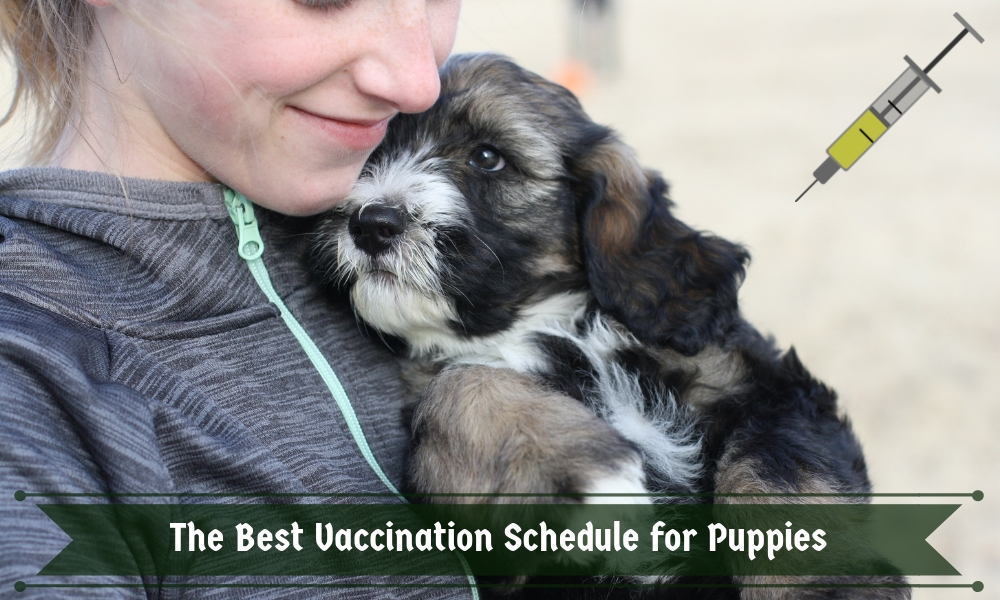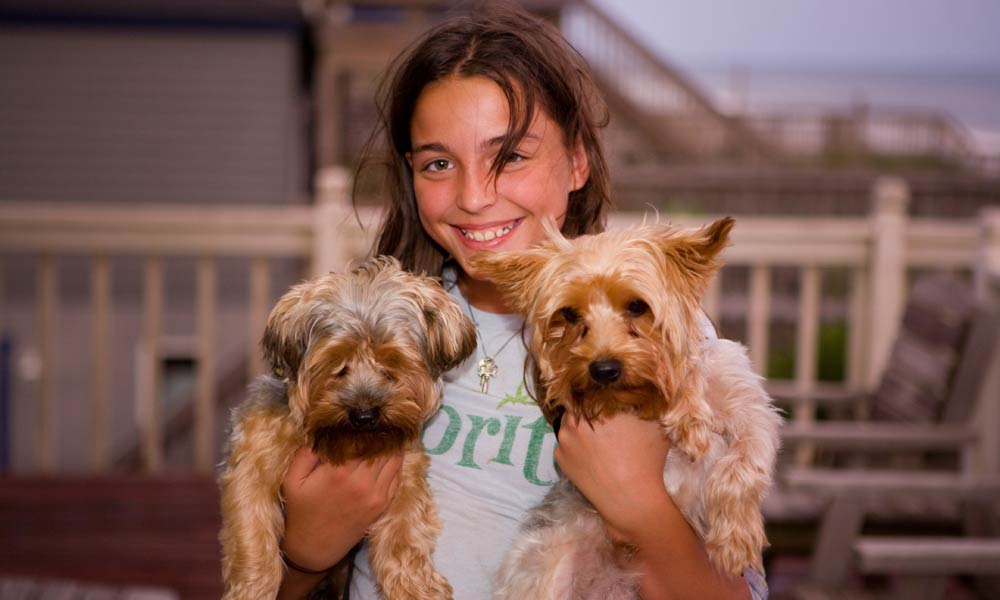
Before we begin this article, you must know that there is not a single best solution for vaccinating your pup. There are many different views on when is best to vaccinate, and we’re not going to say that any of them are wrong. However, if you are looking for advice on what we consider to be the best vaccination schedule for puppies, we will provide it in this article.
Getting a new puppy can be confusing, especially when it comes to vaccinations. There is so much conflicting information out there, that you may have no idea which advice is the best to follow. Here is everything you need to know about the best vaccination schedule for puppies, including when to vaccinate, and what to vaccinate for.
Contents
6 to 8 Weeks Old
The earliest age that a puppy should be away from their mother is 8 weeks, which is the most common age to bring a new puppy home. (See our New Puppy Checklist here). When adopting a new puppy, regardless of from a breeder or a rescue organization, you should get a standard health record that indicates if they’ve already had any of their shots, and when.
There’s a good chance at 8 weeks of age that your pup has already been to the vet once, and has received these vaccinations at 6 weeks of age. These are their core shots, which have to be followed up on a schedule in order to make sure that they’re effective. There are recommended and optional vaccinations for puppies from 6 to 8 weeks, otherwise known as “core” and “non-core”. They include:

Recommended
- DA2P – If you’ve had a puppy before, you definitely will recognize this abbreviation. This is the only vaccine that is considered necessary at this age. DA2P is a combination shot, which stands for distemper, adenovirus (canine infectious hepatitis), and canine parvovirus (CPV). These are considered the “core” vaccines. This combo may also be administered as DA2PP, with the extra “P” standing for parainfluenza. The protection against parainfluenza is not considered one of the core vaccines, but is still incredibly important.
Optional
- Bordetella (Kennel Cough) – The vaccination against Bordetella is generally only recommended if you are planning on boarding your dog at a kennel, or if they are going to be spending an excessive amount of time amongst strange dogs (if you plan on taking them to puppy socialization/obedience classes, taking them to a dog park, enrolling them in doggy daycare, etc.). Other than that, there is no real reason to give your dog this extra vaccine at this, or any age.
- Canine Influenza Virus – This is otherwise known as the “dog flu”. This is again mostly necessary if your dog will often be boarded, at daycare, or regularly going to a grooming facility. If this is the case, it is absolutely recommended that you get your puppy vaccine against canine influenza virus. Whether or not you choose to get your puppy vaccinated against Bordetella or canine influenza virus, it is important to ask your kennel, daycare, grooming facility, etc. if they require their clients to have these shots, to make sure that this is a safe place for your pup.
9 to 12 Weeks
If your puppy has already received the above shots at 6 to 8 weeks, they will not yet be requiring a booster. The recommended and optional vaccines for 9 to 12 weeks are going to be the same for 6 to 8 weeks (DA2P/DA2PP, Bordetella, canine influenza virus). Again, depending on your puppy’s age when you adopt them, this may be their first or second visit to the vet.
12 to 16 Weeks

This is a critical time period. It is necessary to bring your puppy back to the vet to get their booster shots. Your puppy has a maternal immunity received from its mother in the form of maternal antibodies. At this age, the maternal immunity is starting to lessen, and your puppy’s own immune system is beginning to develop. Getting these boosters to their initial shots is necessary to help your puppy build their immune system, thereby building their immunity or increasing their protection to diseases.
Recommended
- DA2P/DA2PP – This is going to be the second dose in the 3-part administration of this vaccine.
Optional
- Bordetella (Kennel Cough) – Will still be offered as an option at this age.
- Rabies – Many will opt to give their puppies a rabies shot at this age, as it is legally required to have your dog vaccinated against rabies. However, different states have different regulations in regards to what age they must be vaccinated, so consult with your local vet about when is best. It is safe to give a rabies vaccination to a puppy 13 weeks or older.
- Leptospirosis – If you choose to get your puppy vaccinated against leptospirosis, this will be a two-part vaccine that your puppy will receive in its first year. This is again, an optional vaccine, although some veterinarians would consider it “core”. Although it’s not incredibly common, it can potentially be fatal to your pet if contracted, causing liver and/or kidney failure. It is developed through bacteria, which can be consumed by drinking contaminated water or mud contaminated with rodent urine. It can also affect people, making it zoonotic.
- Lyme disease – Another optional vaccine for your puppy is the vaccine against Lyme disease, which is also a two-part vaccine. A dog or puppy would get Lyme disease the same way that we would, which would be through the bite of an infected tick.
15 to 17 Weeks

These are the last vaccines that your pup is going to need for a while, so make sure you don’t skip this appointment! It’s important to make sure that you’re following up on these booster shots, as it really is essential to making sure that the other two appointment’s shots have taken properly. With no follow-up, those appointments could have been for nothing, and your pup could be mostly unprotected.
Recommended
- DA2P/DA2PP (Booster) – This is going to be the third and final dose of the 3-part administration of this vaccine.
Optional
- Leptospirosis (Booster) – This is only necessary if you opted to get the initial shot at the 12 to 16-week appointment.
- Lyme disease (Booster) – This is only necessary if you opted to get the initial shot at the 12 to 16-week appointment.
This completes the puppy’s vaccination schedule! After one week of receiving these booster shots, your puppy will be fully protected against going to high traffic areas, such as dog parks, grooming centers or visiting pet stores. Your puppy is also fully safe to attend doggy daycare at this time.
Keep in mind that this puppy vaccination schedule doesn’t mean that your puppy is finished with their vaccinations for life. It is recommended that they get booster shots every year in order to keep up their protection. It is also recommended that you spay or neuter your puppy at 6 months of age, although it can be argued that this is actually too young, as it can interfere with the puppy’s growth and development. Speak to your veterinarian and decide on what you both think is best for your pup.
Why Does My Puppy Need to Have 3 Sets of the Same Shot?

As mentioned above, your puppy has a maternal immunity that was received from its mother in the form of maternal antibodies. When the puppy becomes around 12 weeks of age, the maternal immunity is starting to lesson, and the puppy’s own immune system begins to develop. These maternal antibodies actually come from colostrum, or the “first milk” that the puppy receives from their mother right after being born. If your puppy was one of a large litter, they may not have received as much colostrum as another puppy. Other factors may have contributed to your puppy having a weaker immune system than others, including just being born with deficiencies in their immune system, or the fact that the mother wasn’t vaccinated well, or was not healthy enough to produce good quality milk.
All of these potential reasons are why puppies need their core shots in a set of 3 – it is safest to cover every possible scenario, because there’s no way to know how much maternal immunity each puppy has. While their maternal immunity is slowly wearing off, we are helping build that immunity, so there is no period of time where your puppy is completely unprotected.
Giving them these shots in a set of three allows them to slowly boost their immunity and accept the vaccines into their system, so we can be sure that they are protected
When is it Safe for My Puppy to go to Socialization/Obedience Classes?
Your puppy can start attending puppy classes as soon as one week after their first round of DA2P/DA2PP shots. This applies whether they received these shots at 6 weeks, at 9 weeks, or later. However, this will depend on whether the DA2P/DA2PP shot and the Bordetella shot are required to be administered to all pups in the class before attending, and whether the facility is clean.
It is also safe for your puppy to meet other dogs and puppies at this age if they are known to be healthy and up to date on their vaccines. Remember, if there is any doubt, don’t risk it.
Why are there Recommended and Optional Vaccines?

Recommended or “core” vaccines have been determined to be the most important in keeping your pup healthy. Certain viruses and diseases, such as distemper, adenovirus (canine infectious hepatitis), and canine parvovirus (CPV) are so common and so contagious, that receiving these vaccinations from an early age could prevent the puppy from receiving one of these devastating illnesses. It will also give you peace of mind when it comes to socializing your dog in the real world – you don’t need to constantly be wondering whether or not a dog is healthy when you meet them on the street. It has been determined that the “core” vaccine shots are necessary despite your lifestyle or where you live.
Any vaccines that are optional or “non-core”, such as Bordetella, Leptospirosis and Lyme disease, are less high risk, and more so have to do with your lifestyle, and if you choose to involve your dogs in activities that could involve other strange dogs who aren’t required to have been vaccinated. Your vet will always take you through the required and optional vaccines at each age, and they will make sure you know that the optional ones are just that – optional. Some vets really do not wish to overvaccinate their dogs. They may think it is unnecessary to put the dog through vaccination if they don’t absolutely need it, to save money, or both. Either way, it is important to be kept in the know about which vaccines are recommended, and which ones are possibly unnecessary.
Conclusion
When it comes to your pup’s vaccination schedule, only you and your vet know what is 100% right for your pup. As we’ve stated numerous times, beyond the core vaccinations, it all comes down to you and your pup’s lifestyle.
Be sure that you receive a vaccination record when adopting your puppy. This record will include all your puppy’s vaccinations in the same place (often in the form of a pamphlet). This will allow quick and easy access to your puppy’s vaccinations if there is ever an emergency, including the exact date that they were administered.Getting a new puppy is exciting, but remember the responsibility you have to make sure that your pup is protected in this critical time period, and stays protected in the future.
I grew up in a household that was filled with animals. I believe that my fate as a dog-loving person was sealed in early childhood since my parents owned several dogs of varying sizes and breeds. There was no choice but to take care of and learn about dog habits and the best animal care practices — otherwise, I’d be clueless about how to go about the creatures I was surrounded by day and night.
As a life-long puppy lover, I know a thing or two about dogs and how to go about caring for them in the best way possible. Although I’m not a professionally trained dog behaviorist, trainer, or veterinarian, all of my knowledge and experience with canines comes from a place of love and a deep-rooted passion for dogs and animals in general.
Seeing as dogs kept me company throughout every stage of my life, I decided to follow a different path in my academic life and obtained a Bachelor’s and Master’s degrees in Marketing Management and Digital Advertising, which ultimately allowed me to combine my professional training and personal experience by creating the ultimate dog lover’s resource website! Along with my husband, Dave, I run MySweetPuppy for like-minded dog lovers who want to have a single, clear, and reliable information source about anything and everything related to dogs and their well-being.

![[HOW TO] Get Rid Of Puppy Worms Today](https://mysweetpuppy.net/wp-content/uploads/2020/09/How-much-should-I-feed-my-8-week-old-lab-puppy.jpg)

